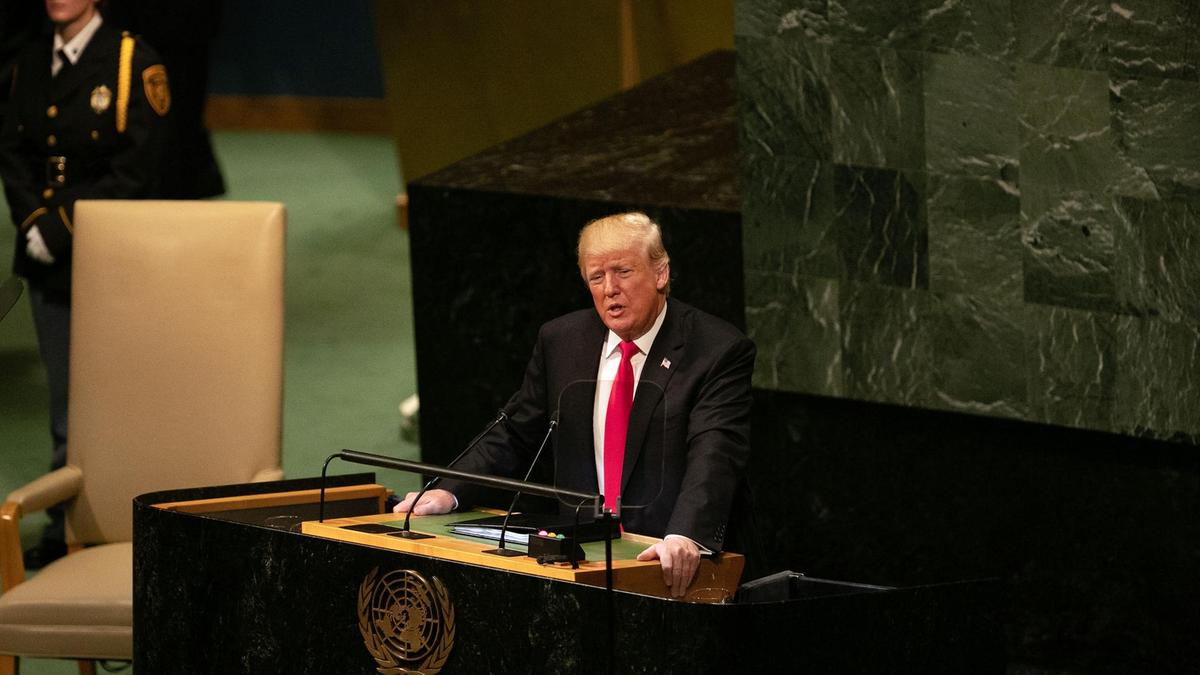Article

UNGA 2019 comes when co-operation and consensus are at their weakest points
The United Nations needs to rise to the challenges posed by technology and speak to a younger generation.
This week the global foreign policy elite are relocating to New York for the annual jamboree of statecraft, the UN General Assembly, now in its 74th year.
Despite being hosted in New York, the city that never sleeps, UNGA can often feel sleepy. The rooms have too little air and the speeches too much of it. Every head of delegation gets a turn at the microphone, many including platitudinous nods to regions of conflict. Occasionally there is a rogue showboat intervention. I remember watching former Libyan dictator Muammar Qaddafi ripping up the UN Charter, and then Venezuelan president Hugo Chavez talking of the “smell of sulphur” at the podium after a George W Bush speech. But whether there is sound or fury, most speeches end up signifying nothing.
Away from the podium, jetlagged officials stagger from meeting to meeting. This is the epicentre of diplomatic speed-dating. Encounters are ranked and prioritised carefully, from plenaries, pull-asides and pool sprays; to bilaterals and brush-bys; to “grip and grins”. Most are carefully choreographed, but not all. At one UNGA, I organised an ambush of a South African president who wanted to avoid a difficult meeting with the British prime minister. At another, I had to bundle the British prime minister into a side room to avoid an unwanted encounter with Robert Mugabe. Promising careers can be broken by a graveyard speaker slot or an uncomfortable seating arrangement. Countries such as Israel, Iran, the US and Saudi Arabia face the protocol nightmare of proximity.
The unspoken reality in the corridors this year is that what the United Nations represents – a system based on states, hierarchies and the status quo – is at a weak point. Nationalism and populism are more fashionable than consensus and co-operation. We are only just beginning to see how digital connectivity will tear through the post-1945 global infrastructure. The pace of technological change means that the internet has often been something that happens to the global architecture, not a force marshalled fully in support of our collective objectives. All this is at a time when Donald Trump's presidency has orphaned the rules-based international system.
But don’t get me wrong. The UN might not be perfect and the cast has a tendency to inauthentic hyperbole, yet no one has yet come up with a better idea for global co-existence. Beyond the protocol, preening and pinball diplomacy, the tedium and tantrums, what happens in the corridors this week really matters to all of us. And we – and the UN – do not have the luxury of waiting for a US president with a more enlightened world view.
So I think there are three tests for the UNGA this year if it is to reverse several years of agonising decline.
Firstly, can it respond – with practical actions, not just fine words – to the extraordinary mobilisation of young people on the climate crisis? Under an energetic new communications chief, the UN has sought to ally itself with 16-year-old Swedish activist Greta Thunberg and her growing army of determined campaigners. The gap between those inside and outside the conference rooms is narrowing. But the activists and the UN now need to turn this into real pressure on those resisting change. We must not mistake activity for progress.
Secondly, can the UN still act as a means of reducing friction on key international tensions? The risk of further escalation and provocation between Iran and Saudi Arabia tops this year's long list. The UN Security Council must show that it will not be paralysed by vetoes, as it has too often in the past. Diplomacy is hard, patient, frustrating work but the alternative is always worse. The aspirations of the UN's Responsibility to Protect doctrine were buried in the rubble of Syria.
Thirdly, can the UN show that it can deal with tomorrow's challenges, not just those of today? This means putting real energy into the effort to secure long-term finance for global education. Once again, the world's leaders will be given the chance to support creative new mechanisms such as the Education Cannot Wait global fund and the International Finance Facility for Education, a platform that aims to mobilise more than $13 billion via a consortium of public and private donors and international finance institutions to ensure 200 million more young people get the opportunities they crave.
Preparing humanity's future also means accelerating the effort to respond to the challenges and opportunities posed by technology. One example is the Global Tech Panel, which meets again in New York this week to develop a response to the growing threats posed by lethal autonomous weapons. Time is very short and the tech community is clear that it is creating risks faster than we can manage them.
The UN and governments alone cannot crack these issues. They require the mobilisation of new, creative coalitions between citizens, civil society and businesses. But the UN is often the only organisation that can bring together those alliances. So these are the issues on which the UN can begin the fightback, securing not just relevance but influence.
It is easy to be cynical about the hashtags, the celebrity tweets, the vanity photos and the “now or never” cliffhanger campaigns that will dominate social media around the UN again this year. But we all need the UN to rise to these challenges: we have subcontracted to it many of the biggest challenges facing humanity. And we ourselves need to rise to the challenge too, so let’s not subcontract our ingenuity, our survival instinct and our consciences.
Photo description / credit: US President Donald Trump at last year's United Nations General Assembly. Jeenah Moon / Bloomberg

